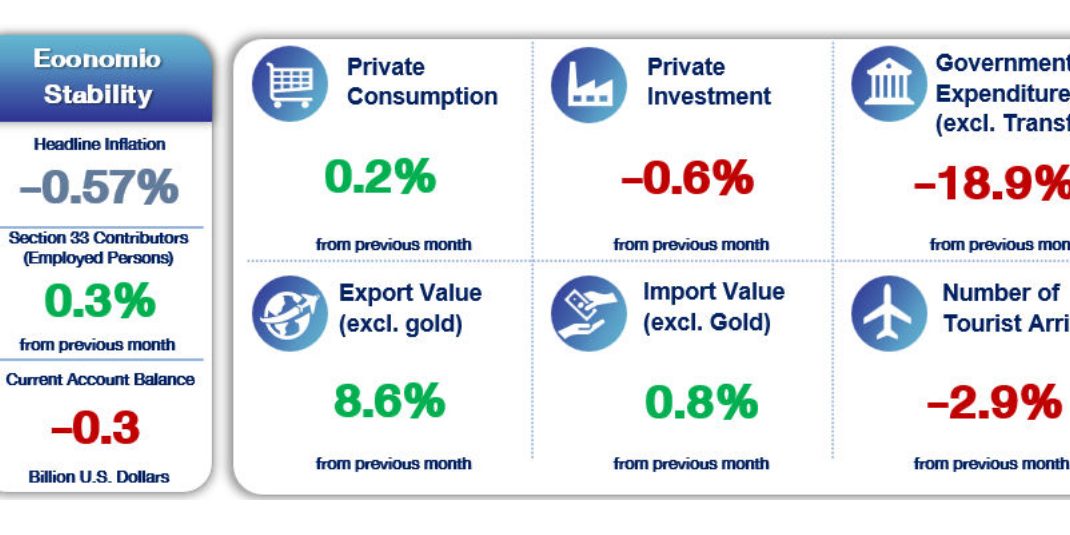Thai Economy 2025: Navigating Global Headwinds with Resilience
The Thai economy in 2025 is demonstrating resilience. It faces a complex global landscape. While some sectors experience a slight slowdown, key areas like exports and domestic consumption provide crucial support. This article delves into the nuances of Thailand’s economic performance. It highlights the factors shaping its trajectory. We will also discuss what to expect for the remainder of the year.
A Measured Softening: What the Data Says
Recent reports from the Bank of Thailand indicate a softening in the Thai economy for May 2025. This is when compared to the previous month. The moderation is primarily due to a slowdown in the service and manufacturing sectors. Manufacturing production, in particular, experienced a decline. This was influenced by factors such as prior inventory replenishment and the temporary closure of an oil refinery for maintenance.
Tourism: A Mixed Picture
Tourism, a cornerstone of the Thai economy, presented a mixed picture. While overall tourism receipts dropped, this was largely due to a decline in long-haul travelers. These visitors typically have higher spending per trip. Consequently, this suggests a shift in the tourist demographic, with short-haul tourists from countries like China, Malaysia, and Japan showing an increase. Overall, the tourism sector experienced a decline in both revenue and the number of foreign tourists.
Exports and Consumption: Pillars of Growth
Despite some headwinds, merchandise exports emerged as a significant driver of growth. The Bank of Thailand reported a robust increase in exports. This was propelled by strong global demand for electronics used in data centers. Furthermore, shipments of products like agricultural goods and electrical appliances accelerated during a reciprocal tariff suspension period. This highlights the country’s strong position in the global supply chain for certain key products.
Private consumption also remained stable. It was bolstered by a notable surge in the consumption of durable goods. While services consumption saw a slight dip, the overall stability in private consumption signals underlying consumer confidence within the Thai economy.
Government Spending and the Automotive Sector
Government spending contracted in May 2025. This included both current and capital expenditures. The contraction is a result of a high base effect from the previous year. That period saw accelerated disbursements following the enactment of the Budget Act, B.E. 2567.
On a brighter note, the automotive sector is showing signs of recovery. Improvements in passenger car production and domestic sales indicate a potential rebound for this important industry.
Inflation and External Balances
In terms of economic stability, headline inflation eased slightly in May 2025. This was primarily due to lower fresh food prices. While energy inflation remained negative, core inflation continued to rise, in tandem with higher prepared food prices.
The current account deficit narrowed, supported by a return to a trade surplus. However, the services, income, and transfers balance registered a larger deficit. This was due to seasonal profit repatriation by foreign businesses.
Labor Market and Outlook for the Thai Economy in 2025
The overall labor market demonstrated improvement. This was primarily driven by increased employment in the manufacturing sector. This positive trend in employment provides a good foundation for sustained domestic demand.
Looking ahead, the Thai economy in 2025 is expected to continue navigating a complex environment. The robust performance of exports and stable private consumption will, therefore, be crucial for offsetting softness in other sectors. Continued government policy support and a rebound in the long-haul tourism segment will also be key factors to watch for further economic acceleration.
Accounting Services: Crucial for Business Growth in Thailand’s Market
As the Thai economy evolves, businesses operating in the country, whether local or international, require robust accounting services in Thailand. This ensures compliance and optimizes operations. Given the dynamic economic landscape, accurate and timely financial reporting is, furthermore, more critical than ever.
Professional accounting firms in Thailand offer a comprehensive range of services. These include:
- Bookkeeping and Financial Reporting: Essential for maintaining clear financial records and generating accurate financial statements.
- Tax Compliance and Planning: Navigating Thailand’s tax regulations can be complex. Expert advice helps businesses comply with VAT, corporate income tax, withholding tax, and other levies. It also identifies opportunities for tax efficiency.
- Payroll Services: Managing payroll accurately and in compliance with labor laws is crucial for businesses of all sizes.
- Business Advisory: Beyond mere compliance, many accounting firms offer strategic advice. This includes financial planning, cash flow management, and business structuring. Such advice helps companies capitalize on economic trends.
- Company Registration and Secretarial Services: For new entrants to the Thai market, these services are invaluable. They help in setting up operations smoothly and adhering to local regulations.
The demand for high-quality financial and accounting services in Thailand is growing. This reflects the increasing sophistication of the business environment. It also shows the need for reliable financial insights to support decision-making in 2025 and beyond. Businesses seeking to thrive in this market should, therefore, consider partnering with reputable accounting professionals. You can also explore this insightful article on tax savings and international trade policies for business benefit.
Interested in accounting services that can help your business thrive in the Thai market? Contact Bookkeeping Co.,Ltd. today!




